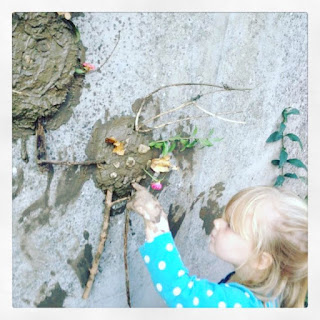The Skills Required by Practitioners
“Practitioners
with a deep knowledge of child development and an understanding of the ways
that very young children learn most effectively will be able to see the unique
potential in any outdoor learning environment, however limited it may be.”
(Waite, 2011)
This
statement indicates the overall aspect of a great forest school teacher. The
outdoor environment can provide an array of affordances for children and it is
our job as practitioners to recognise these crucial learning opportunities.
It is an Early Years requirement that practitioners are:
“Supportive of the
child’s own efforts and independence”
(Early
Education, 2012)
 This proves to be a great skill when interacting and building
relationships with young children in the outdoors. Each child is individual and
unique, having independent ideas and thoughts. It is important that these
moments of creativity are recognised and valued with praise, to encourage a
feeling of exploration and acceptance within each child.
This proves to be a great skill when interacting and building
relationships with young children in the outdoors. Each child is individual and
unique, having independent ideas and thoughts. It is important that these
moments of creativity are recognised and valued with praise, to encourage a
feeling of exploration and acceptance within each child.Practitioners must demonstrate other aspects to maintain children’s interest and excitement. These consist of skills such as confidence; embracing the outdoors and making the most of all of the resources with an enthusiastic and positive attitude.
Louv (2008) supports this point and states that:
“One of the most important gifts to give a
young person is an infectious enthusiasm for the outdoors”.
When a child is supported by
an adult who is willing and confident, they will be more likely to partake and
enjoy exploring through a positive environment.

Another key characteristic is having knowledge and recognition of the quality within the outdoor space, to proceed in providing openings which extend and expand on learning. To explain this point, when an adult is met with an environment that consists of trees, leaves and shrubs, they must be aware of the affordances and potentials of the surrounding that could enhance children’s thinking and support their development.
As a teacher of the outdoors, it is vital that the physical ability and practicality of oneself is strong. Children may notice large branches that they could utilise, or they may be interested in building a fire pit in an overgrown patch of land and as the practitioner, it is expected that those learning needs are met and supported through the use of tools, physical strength and imagination. To ensure that children are gaining valuable experiences, there must be a demonstration of good communication skills between practitioners, ensuring that each person is involved in the process, having an input into what could be carried out, which exhibits a good secure relationship in working together to aid children’s development.

To evaluate and conclude, this discussion is focussed on the key features for a practitioner working in the outdoor environment, approaching the skills and traits needed to provide such high quality learning experiences. Examples of these are physical strength, imagination and the process of reflecting thoroughly on previous activities, to provide new learning experiences that incorporate children's interest. The aspect of disability within forest school practices has been briefly highlighted and this is something that could be further discussed, to gain different opinions and views.
Post by Gemma Nield
Great blog, Gemma. It still amazes me how many parents don't 'do' outdoors with their children. It doesn't have to be the full woodland experience. Even a simple walk around the place where they live can be a treasure trove of nature. However, I know not every child is fortunate enough to live in a place where this is possible, nor in a family where this is a priority for learning. That is why access to forest schools and the like is vitally important in offering those less in touch with the outdoors to enjoy valuable experiences. Also a very true point that the adult must be confident, happy and comfortable with the experience in order to foster encouragement and enthusiasm, all the time allowing the child to feel safe and confident in the 'great outdoors'. Tina Bailey
ReplyDeleteTina,
DeleteThank you for such a wonderful comment. Extremely informative and all so true! The issue with an increase in children staying indoors is on the rise and it is our job as practitioners to invite them to experience all of the great opportunities that they are missing out on in the outdoors. I notice that you agree with the fact that practitioners should be comfortable with the experience in the outdoors. However, I am interested to hear what you think about practitioners teaching Forest School that have not had a childhood spent outdoors, where they are not necessarily aware of the affordances and benefits that the environment has to offer?